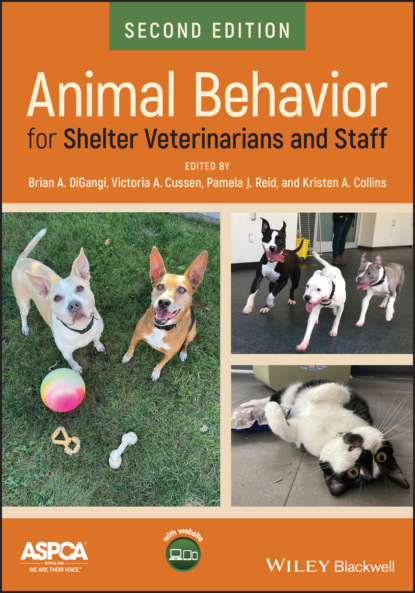Introduction 23.2 Small Mammal Housing and Husbandry 23.3 Rabbits 23.4 Ferrets 23.5 Guinea Pigs 23.6 Other Small Rodents 23.7 Conclusions References 24 Equine Care 24.1 Introduction 24.2 Basic Husbandry Needs of Horses Relevant to Behavior 24.3 Quarantine 24.4 Environmental Enrichment 24.5 Common Behavior Problems Relevant to Shelter Environments 24.6 Behavior and Skills Assessment 24.7 Calming Medications/Supplements 24.8 Auction Rescue Considerations 24.9 Low‐Stress Positive Reinforcement‐Based Handling of Horses for Health Care 24.10 Conclusions References Appendix 24.A Needle Sticks Appendix 24.B Oral Dosing Appendix 24.C Eye Medications Appendix 24.D Intranasal Vaccination Appendix 24.E Rectal Temperature 25 Animal Placement and Follow‐Up 25.1 History and Philosophy of the Adoption Process 25.2 Improving Adoption Likelihood 25.3 Increasing the Likelihood of Successful Adoptions 25.4 Conclusions References Appendix 25.A Behavioral Adoption Counseling—Cats Appendix 25.B Behavioral Adoption Counseling—Dogs
13 Appendix A: Canine Body Language A Neutral Relaxed B Greeting Behavior C Initial Greeting D Play Solicitation E Arousal F Offensive Aggression G Defensive Aggression H Maternal Aggression I Crouch J Roll Over
14 Appendix B: Feline Body Language A The Confident Cat B The Confident Cat: At Ease C Distance‐Reducing Behaviors D Distance‐Increasing Behaviors E The Anxious Cat F Defensive Aggression G The Predator H The Groomer
15 Appendix C: Animal Behavior Professionals Academy of Veterinary Behavior Technicians—www.avbt.net American Board of Veterinary Practitioners—Shelter Medicine Practice—https://abvp.com/ Applied Animal Behaviorist Certified Professional Dog Trainer (CPDT)—www.ccpdt.org Trainer Veterinarian Veterinary Behaviorist—www.dacvb.org
16 Index
List of Tables
1 Chapter 3Table 3.1 The four contingencies in operant conditioning.Table 3.2 Reinforcement schedules.Table 3.3 The ABCs of behavior analysis.
2 Chapter 4Table 4.1 Common Stressors and Behavioral Signs of Stress in Shelter Dogs a...Table 4.2 Behavioral signs of pain in dogs and cats (Mills et al. 2020; Bac...Table 4.3 Endocrinological disorders that may lead to behavioral changes.
3 Chapter 5Table 5.1 Sources of program‐planning information.
4 Chapter 9Table 9.1 Behavior evaluations in the published literature.
5 Chapter 10Table 10.1 Key considerations for in‐shelter housing selection.
6 Chapter 15Table 15.1 Advantages and disadvantages of frameworks for assessing behavio...Table 15.2 Types of reliability and validity.
7 Chapter 19Table 19.1 Common ethical decision‐making frameworks (Mullan and Fawcett 20...Table 19.2 Generic ethical matrix for animal shelters* Table 19.3 Example ethical
